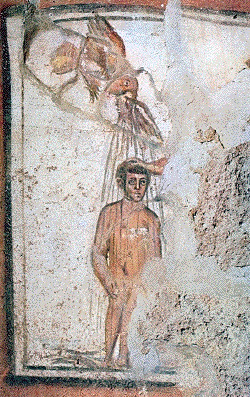Baptism: Difference between revisions
about ritual purification and Sikhism |
MartinPoulter (talk | changes) "cleansing symbol" was too ambiguous |
||
| (2 intermediate revisions by one other user not shown) | |||
| Line 1: | Line 1: | ||
'''Baptism''' is a [[Ritual|rite]] or [[ceremony]] performed by [[Sikhism|Sikhs]] and [[Christianity|Christians.]] It is done as a [[ |
'''Baptism''' is a [[Ritual|rite]] or [[ceremony]] performed by [[Sikhism|Sikhs]] and [[Christianity|Christians.]] It is done as a [[symbol]]ic [[ritual purification|cleansing]]. For Christians it shows that the person being baptized has become a follower of [[Jesus]], and it can represent the joining of the Christian family. For Sikhs, taking Baptism or Amrit Sanskar is most important and it represent followers of [[Sikhism]]. |
||
==Methods== |
==Methods== |
||
[[Roman Catholicism]] baptize [[infant]]s to mark their becoming members of the church.<ref>{{cite web|url=http://www.vatican.va/archive/ENG0015/__P3G.HTM|title=Catechism of the Catholic Church - The Sacrament of Baptism}}</ref> It is a [[sacrament]] usually performed by a [[priest]]. |
[[Roman Catholicism|Roman Catholics]] baptize [[infant]]s to mark their becoming members of the church.<ref>{{cite web|url=http://www.vatican.va/archive/ENG0015/__P3G.HTM|title=Catechism of the Catholic Church - The Sacrament of Baptism}}</ref> It is a [[sacrament]] usually performed by a [[priest]]. Anglicans, Methodists, Lutherans and Presbyterians also baptize babies. Baptists and many other churches, baptize only when the person is old enough to decide that they are ready to declare their faith in Christ. |
||
Some religious groups practice baptism by sprinkling a small amount of water on the person, usually their head. Other groups put the person |
Some religious groups practice baptism by sprinkling a small amount of water on the person, usually their head. Other groups put the person under the water. Almost all Christians baptize in the name of the Father, Son and Holy Spirit. A few baptize only in the name of Jesus. <ref>https://www.britannica.com/event/Jesus-Only</ref> |
||
[[File:Baptism - Marcellinus and Peter.jpg|thumb|right|200px|Baptism in early Christian [[art]]. This is a [[fresco]] in the [[catacomb]]s of [[Rome]].]] |
[[File:Baptism - Marcellinus and Peter.jpg|thumb|right|200px|Baptism in early Christian [[art]]. This is a [[fresco]] in the [[catacomb]]s of [[Rome]].]] |
||
Revision as of 13:23, 2 May 2024
Baptism is a rite or ceremony performed by Sikhs and Christians. It is done as a symbolic cleansing. For Christians it shows that the person being baptized has become a follower of Jesus, and it can represent the joining of the Christian family. For Sikhs, taking Baptism or Amrit Sanskar is most important and it represent followers of Sikhism.
Methods
Roman Catholics baptize infants to mark their becoming members of the church.[1] It is a sacrament usually performed by a priest. Anglicans, Methodists, Lutherans and Presbyterians also baptize babies. Baptists and many other churches, baptize only when the person is old enough to decide that they are ready to declare their faith in Christ.
Some religious groups practice baptism by sprinkling a small amount of water on the person, usually their head. Other groups put the person under the water. Almost all Christians baptize in the name of the Father, Son and Holy Spirit. A few baptize only in the name of Jesus. [2]

Bible times
In the Old Testament, a similar washing ceremony was done when priests were ordained.[3] Jesus was baptized by John the Baptist before he began his ministry.[4] The usual form of baptism among the earliest Christians was for the person to be immersed totally or partially. But sprinkling, or pouring, was also practiced at an early day with sick and dying persons when total or partial immersion was not practical.[5]
Other websites
- "Baptism." Encyclopædia Britannica Online.
References
- ↑ "Catechism of the Catholic Church - The Sacrament of Baptism".
- ↑ https://www.britannica.com/event/Jesus-Only
- ↑ Leviticus 8:6,7
- ↑ Matthew 3:13–17, Mark 1:9–11, Luke 3:21–23
- ↑ The Amazing Bible Factbook. New York: American Bible Society. 2008. pp. 246, 247. ISBN 978-1603207782.
